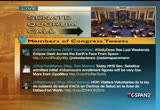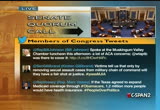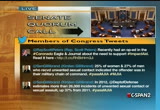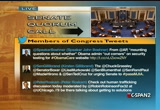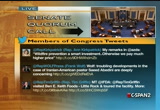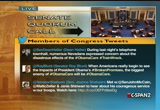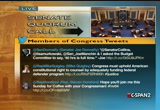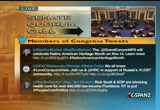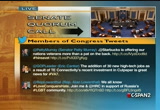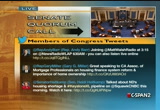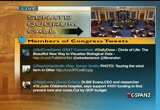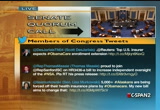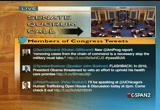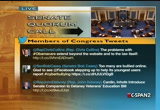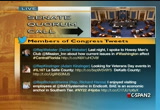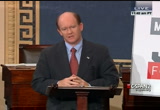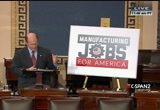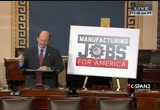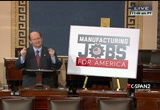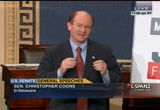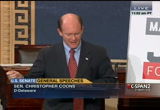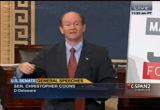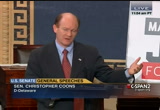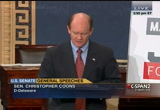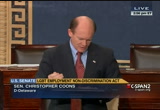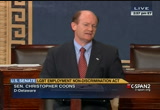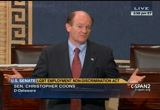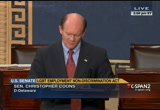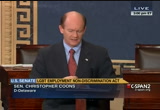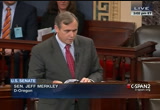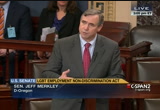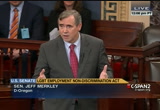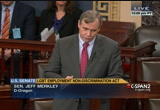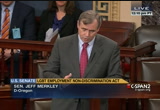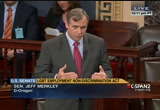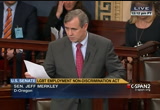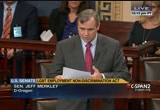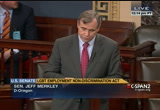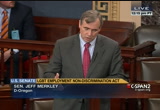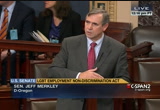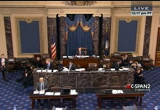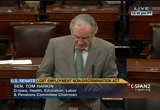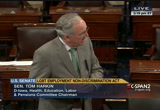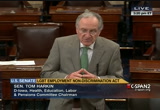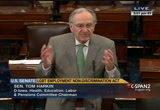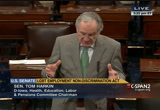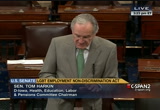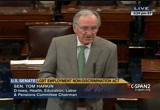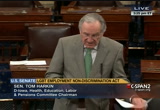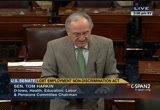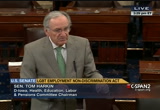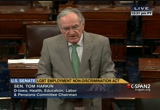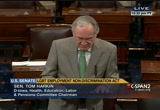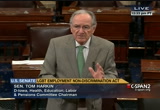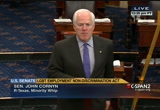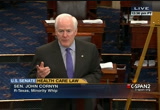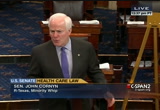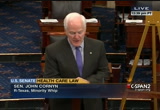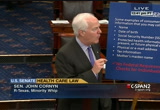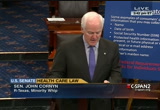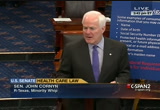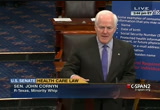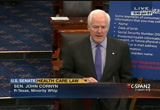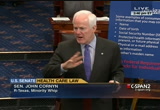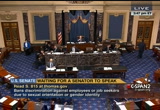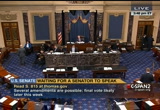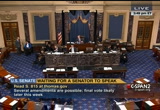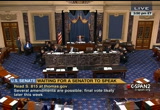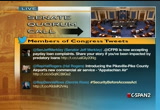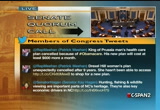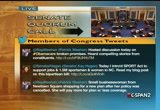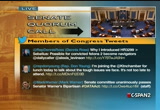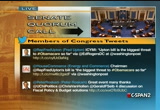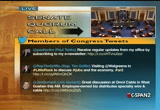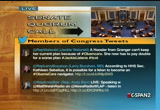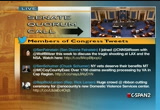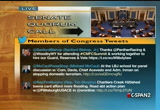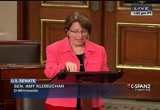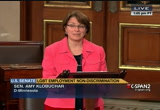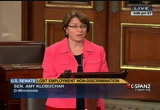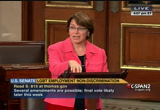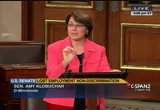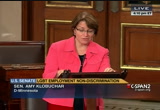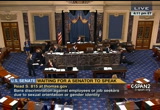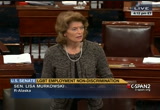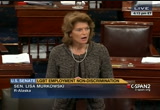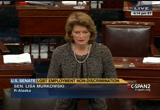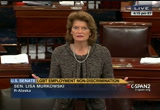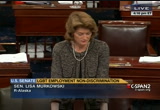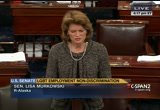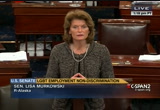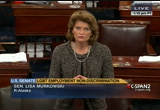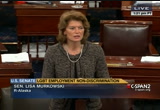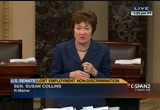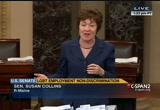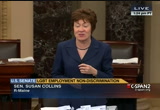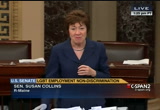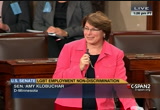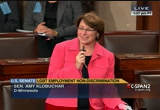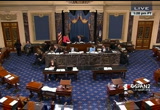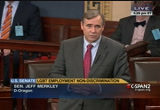tv Key Capitol Hill Hearings CSPAN November 6, 2013 2:30pm-4:31pm EST
2:45 pm
a senator: mr. president? the presiding officer: the senator from delaware. mr. coons: i ask unanimous consent that the quorum call be vitiated. the presiding officer: without objection. mr. coons: mr. president, i come to the floor once again today to talk about jobs, about manufacturing jobs, manufacturing jobs as we all know are high quality jobs. manufacturing jobs come with higher pay and higher benefits. manufacturing jobs help create other local service sector jobs and manufacturing jobs contribute more to the local economy than jobs in any other sector. and beyond that, mr. president, manufacturers invest the most of any industry sector in research and development, something critical to america's continued
2:46 pm
growth and our security as a leading innovation economy. so last week, 21 senate colleagues and i joined in a new initiative, the manufacturing jobs for america initiative, to help create good manufacturing jobs here at home today and tomorrow. it's grown now to 25 senators who've all contributed different policy ideas. this isn't one big megabill with dozens of sponsors but just one bill. instead, it's a constellation of 40 different proposals. some of them have already been introduced as bills and half of those that have been introduced are bipartisan. these bills represent some of our best ideas about how we can work together across the aisle to provide badly needed support for our growing manufacturing sector here in the united states. there's four different areas that these 40 different proposals fall into and i wanted to talk about one of them today. three of them are how do we open markets abroad, how do we strengthen america's 21st
2:47 pm
century manufacturing work for force, how do we create a long-term environment for growth three manufacturing strategies, but the fourth is how do we ensure access to capital. so of the four today i wanted to speak to access to capital. as any business owner knows, you can't ensure the long-term growth and vitality of your business unless you have capital to invest. whether in research and development, new workers, new products, or new equipment to expand into new markets. so access to capital is absolutely essential to manufacturing jobs for america. the three bills i'm going to talk about today which are part of this constellation of 40 different proposals, each would expand access to capital for manufactures in different ways. let me start with the start-up innovation credit act. this is an existing bipartisan bill that i've introduced along with senators enzi, rubio, blunt, and moran, who are all republicans, and senators
2:48 pm
schumer, stabenow and kaine, all, like me, democrats. although we represent different parties, come from different parts of the country and have different backgrounds, we've all come together to strengthen our economy and, in ti to support in-- and in particular, to support innovation and entrepreneurship. one way we do that now is to support private-sector innovation in manufacturing through the research and development tax credit. the r&d tax credit generates new products and industries, benefiting other sectors. but there's a critical gap in the existing, in the long-standing r&d tax credit. it isn't available to start-ups because they're not yet profitable. this is a tax credit that you can only take if you have a tax liability and are profitable. so we worked together, senator enzi and i and the other cosponsors, to fix this hole with a relatively simple tweak. that's what the start-up innovation credit act does. it allows companies to claim the r&d tax credit against their employment tax liability rather than in income tax liability, a
2:49 pm
corporate income tax liability. supporting small, innovative companies in their critical early stages of research and development could unleash further innovations and unleash greater growth that would spur good job creation for americans for the long run. between 1980-2005, all net new jobs created in the u.s. were created by firms five years old or less. in total, that was about 40 million jobs over those 25 years. this credit is specifically designed with those new, young firms in mind, those early stage firms that are the font of the greatest source of creativity and of jobs. it's limited to those companies that are five years old or less and it's limited to being an offset against their w-2 liability so we can provide some access for early stage start-ups to this r&d credit that encourages them to hire more folks and to grow more quickly. just a part of manufacturing jobs for america. the second bill i'd like to talk about today is the master
2:50 pm
limited partnership parity act. that's a mouthful, mr. preside mr. president, but it also levels the playing field in access to credit. but instead of giving smaller early stage start-up companies the same access to capital that larger, more mature firms have, this bill levels the playing field in the energy sector and it levels the playing field in particular for clean energy firms. this is a bipartisan bill as well. i introduced it with democratic senator debbie stabenow as my lead cosponsor and republican senators jim moran and lisa murkowski. and i am grateful for their persistent and engaged leadership on this bill. i'm thrilled in the last couple of days that democratic senator mary landrieu and republican senator susan collins have signed on as cosponsors as well. the m.l.p. parity act allows us to really have an all-of-the-above energy that strategy. as i've heard as i presided in my first two years, as i served on the energy committee, there are many senators here, republican and democrat, who
2:51 pm
think we shouldn't be picking winners and losers in technology and we should be promoting an all-of-the-above energy strategy, and this bill makes that possible in clean energy financing and in preserving a widely used tool for existing traditional energy financing. oil and gas will play a significant role in our nation's energy picture for the foreseeable future, but right now we don't have a level playing field between renewables and between oil and gas and pipelines. for nearly 30 years, traditional nonrenewable sources of energy have had access to master limited partnerships. m.l.p.'s give natural gas, oil and coal companies access to private capital at a lower cost. that's something that capital intensive projects, like pipelines, badly need. but alternative energy projects, i would argue, now need that as well. in fact, in some ways more than ever. i spoke just last night to a group of board members at the national academies of science. and what we spoke about was how
2:52 pm
much technology has developed, has sped up in the clean energy space, but how financial innovation hasn't kept pace. this has held back renewable energy and investments in energy efficiency, even as technology has made energy production and distribution and energy efficiency cheaper to achieve. expanding access through this broad bipartisan bill to low-cost long-term capital would be an important step to letting new energy sources take off and letting them compete on a level playing field with all sources of energy. that's exactly what the m.l.p. pair it'parity act intends to d. last but not least, i was proud to be able to join a number of other senators in cosponsoring the small brew act. senators cardin and begich, senators collins and murkowski, democrats and republicans, have worked together to give small brewers a leg up by lowering the excise tax that they face on the beer they produce. small brewers, such as dog fish head in my home state of
2:53 pm
delaware, are big job creators in communities across this country. as senator ben cardin said on the floor earlier this year, "while some people may think this is a bill about beer, it is really about jobs." and i would say jobs, manufacturing. small and independent brewers today employ more than 100,000 americans and pay more than $3 billion in wages and benefi benefits. sam calgione, the owner of dog fish head bury in my home state of delaware, now employs 180 workers at their facility in milton. of course, what they're manufacturing is not a new or innovative or recently invented product. people have been brewing beer for thousands of years. but sam's done a remarkable job of coming up with a very broad range of different brews and, in fact, of bringing back brew as that are centuries or millennia old by recovering ancient recipes for fan fast i can and tasty -- fantastic and tasty beers. what i'm focusing on, though, today, is about the expansion. this particular company has invested $50 million in a
2:54 pm
state-of-the-art manufacturing facility. and when i recently visited, i was struck at how different it is from the beer bottling plant of the past, from what some may have seen on "laverne and shirley" or what they might have imagined a traditional manufacturing plant to look like. those folks who work on the bottling line, on the manufacturing line at this particular facility have to be able to use programmable logic controls, they have to be able to do quality control and math and to communicate as a team and to communicate in a way this puts them at the cutting edge of advanced manufacturing. this highlights some of the biggest challenges in manufacturing. it takes a lot of money to invest in the plant and machinery to make them capable of competing as a modern-day plant. it takes access to capital. but we also need to change the public's perception of what manufacturing is. it is a very different place to work, a manufacturing line, than it was 20 or 50 years ago. they're safe, they're clean, they're well-lit. these are decent, high-paying jobs. and if we're going to win in the
2:55 pm
global competition for manufacturing, we need to strengthen the skills and the perceptions of manufacturing across our country. well, mr. president, each of the three bills i've spoken about today will help create good manufacturing jobs here in america and i believe are ready for consideration on a bipartisan basis by this chamber. we need to take action together on a bipartisan basis to get our economy going again. and i'll remind you, manufacturing jobs are not just decent jobs, not just good jobs, they're great jobs. they're the jobs of today and tomorrow. they're the jobs that sustain and build the backbone of the american middle class. we already have all the tools in this country to ensure its growth, but if we work together and put in place stronger and better federal policies in partnership with the private sector, we can put jets on our manufacturing sector and it can take off and grow again. with that, mr. president, i'll yield the floor.
2:56 pm
mr. coons: mr. president? the presiding officer: the senator from delaware. mr. coons: mr. president, every so often inbetween the crises, inbetween the ranker an rancor e partisan fighting gerkts an opportunity to make -- fighting, we get an opportunity to make some real progress here in the senate. this week we're considering the employment nondiscrimination, a bill to put in place basic workplace protections for lesbian, gay, bisexual and transgendered americans. it's been a big year for equality nationally and in my home state of delaware. the delaware general assembly legalized same-sex marriage earlier this year in may, giving every delawarean access to the full rights and responsibilities of marriage no matter their orientation. a month later, delaware's general assembly built on its
2:57 pm
three-year-old law protecting lgbt people from workplace discrimination, adding protections for transgendered delawareans as well. these two laws were about dignity, respect, and basic fairness for our neighbors. of course, a month later, the united states supreme court struck down the defense of marriage act, giving all married couples across our country access to the federal benefits they're due. this has truly been an historic year for civil rights and for our country. but for all our progress, much remains to be done. in 29 states, it is still legal for fire someone just because they're gay, just because they're lesbian, or just because they're bisexual. that means more than 4 million americans across those states go to workday in and day out having no protection -- work day in and day out having no protection from being fired summarily because of who they live. and i for 3 million, it's legalo
2:58 pm
fire someone because of their gender identity. i want to thank my colleague from oregon for his hard work in leading this fight on the floor and for the senator from iowa for his long advocacy for this bill that should have passed years and years ago. more than 40% of lesbian, gay and bisexual americans and almost 80% of transgendered americans say they've been mistreated in the workplace because of who they are, because of who they love. clearly there is still work for us to do. the employment nondiscrimination act would provide basic protections against workplace discrimination based on sexual orientation or gender identity. it's a bill that's built on our nation's historic civil rights laws, including the civil rights act and the americans with disabilities act. this is about basic fairness. the overwhelming majority of americans, in fact, more than 80%, think that it is already against the law to fire someone just because they're gay. most fortune 500 companies already have policies prohibiting discrimination based on sexual orientation and gender
2:59 pm
identity in place. some of delaware's biggest employers and companies, dupont, dow, bank of america, t.d. bank, cristiana care and the university of delaware, have led the way with their own policies to protect the rights of lgbt delawareans and their employees. there is real momentum behind these protections and it is time for congress to pass this law. protecting americans from discrimination is part of america's shared values and it needs to be part of our laws as well. no one here thinks it's okay to fire someone simply because they're african-american or because they're a woman or because they're an older american. it's not okay to fire someone because they are gay or transgendered either. equality is a fundamental part of our shared american values. to do unto others, to treat people with the respect and dignity with which you want them to treat you. and majorities in every state support putting these protections in place.
3:00 pm
majorities of democrats, of republicans, and of independents support putting these protections in place. majorities in every christian denomination support putting these protections in placement and the majority of small business owners surveyed support putting these protections in place. freedom from discrimination is a fundamental american value that we don't just share, we cherish. why not put these protections in place now, today to ensure that gay, lesbian, bisexual and transgendered americans will be able to go to work, to earn a living, to provide for themselves and their families without the fear of being fired just because of who they are? mr. president, the opportunity that's in front of every one much us is an important one. leadership on civil rights in this chamber has traditionally been bipartisan, and this period of partisanship on civil rights is only fairly recent and need not be permanent. in fact, this bill is cosponsored by two of our
3:01 pm
republican colleagues, senator collins of maine and senator kirk of illinois. when he came to the floor to speak on enda earlier this week, senator kirk noted the importance of a senator from his home state of illinois, being in a position of leadership on this civil rights issue, this really is an historic opportunity, and when the senate votes on final passage of the employment nondiscrimination act tomorrow, i hope we all will take advantage of this historic opportunity. thank you. and with that, mr. president, i yield the floor. a senator: mr. president? the presiding officer: the senator from arkansas. mr. merkley: i so much appreciate the comments of my colleague from delaware, first speaking to the importance of rebuilding our manufacturing sector, of creating living wage jobs, how important that is to building the middle class, providing the foundation for families to thrive, and then speaking to the core issue we're debating today, that of ending significant discrimination against millions of american
3:02 pm
citizens. the words were well-spoken, i say to the senator from delaware. thank you for your advocacy that will make this nation work better for so many of our fellow citizens. mr. president, this issue of freedom from discrimination is a core issue of freedom. it's a core issue of liberty, and it goes right to the heart of the founding of this country. our founders were chafing under the heavy hand, often from the land that they came from across the ocean. they wanted to be able to forge their own world where they were able to participate fully in society, and so liberty and freedom became right at the heart of our founding documents. our declaration of independence says in the second paragraph we hold these truths to be self-evident, that all men are created equal, that they were
3:03 pm
endowed by their creator with certain unalienable rights, that among these are life, liberty and the pursuit of happiness. and that concept of liberty was echoed when we went to our u.s. constitution and it started out as americans are well aware, we the people, we the people of the united states, in order to form a more perfect union, establish justice, ensure domestic tranquil, provide for the common defense, promote the general welfare and secure the blessings of liberty to ourselves and our posterity, do ordain and establish this constitution for the united states of america. while we the people sought in that year to establish a more perfect union, and we continue in our pursuit of a more perfect union, one with more complete blessings of liberty.
3:04 pm
and what indeed is liberty? that opportunity to participate fully in your society. this was well captured by president lyndon baines johnson. he was speaking in 1965 to howard university students at their commencement. and president johnson said freedom is the right to share, share fully and equally in american society, to vote, to hold a job, to enter a public place, to go to school. president johnson continued it is the right to be treated in every part of our national life as a person equal in dignity and promise to all others. i think president johnson captured well what freedom and liberty are all about, as have many of our major public citizens over time as they sought to examine this core premise of liberty and freedom
3:05 pm
and what it meant in this nation, what it meant to create a more perfect union in this regard. eleanor roosevelt spent a lot of time talking about human rights, and she said where, after all, do universal human rights begin? in small places, close to home, so close and so small that they cannot be seen on any map of the world, yet they are the world of the individual person, the neighborhood he lives in, the school or college he attends, the factory, farm or office where he works. such are the places where every man, woman and child seeks equal justice, equal opportunity, equal dignity without discrimination unless these rights have meaning there, they have little meaning anywhere. and indeed, today we're talking very much about the factory,
3:06 pm
farm and office where eleanor roosevelt spoke of, where if rights do not have meaning there, they have little meaning anywhere. now, it's been long recognized that the opportunity to thrive for the individual is so fundamental to this notion of liberty and freedom is also a powerful force for the good of our nation as a whole. this is well captured by theodore roosevelt. he said practical equality of opportunity for all citizens when we achieve it has two great results. first, every man will have a fair chance to make of himself all that in him lies to reach the highest point to which his capacities unassisted by special privilege of his own, unhampered by the special privilege of others can carry him, to get for himself and his family substantially what he has
3:07 pm
earned. second, theodore roosevelt continued, equality of opportunity means that the commonwealth will get from every citizen the highest service of which he is capable. no man who carries the burden of the special privileges of another can give to the commonwealth that service to which it is fairly entitled. so theodore roosevelt was speaking in the masculine but he was talking about all citizens, men and women, equality of opportunity for the individual and for the benefit of society. senator ted kennedy summarized this concept much more succinctly. he did so on august 5 of 2009 when the bill that is before this body was introduced in that year, the 2009 version, and he said the promise of america will never be fulfilled as long as justice is denied to even one
3:08 pm
among us. so again, the success of the individual in gaining full access to liberty and freedom, full opportunity to participate in society builds a stronger community, a stronger state and a stronger nation. the bill we have before us today is a simple concept, that an individual can pursue that place in the farm or in the factory or in the office without discrimination, that the lgbt citizen has full opportunity to fulfill their potential in the workplace. religious groups from across america have weighed in to say how important and valuable that is. here is a sign-on letter, a letter that is signed by approximately 60 religious
3:09 pm
groups across america, and it's addressed to each of us in this chamber. "dear senator, on behalf of our organizations representing a diverse group of faith traditions and religious beliefs, we urge you to support the employee nondiscrimination act. as a nation, we cannot tolerate arbitrary discrimination against millions of americans just because of who they are. lesbian, gay, bisexual and transgender people should be able to earn a living, provide for their families and contribute to our society without fear that who they are or who they love could cost them a job. enda is a major commonsense solution that will ensure workers are judged on their merits, not on their personal characteristics like sexual orientation or gender identity. we all on you to pass this important legislation without
3:10 pm
delay. this letter from these roughly 60 religious organizations continues -- many of our religious texts speak to the important and sacred nature of work and demand in the strongest possible terms the protection of all workers as a matter of justice. our faith leaders and congregations grapple with the difficulties of lost jobs every day, particularly in these difficult economic times. it is indefensible that, while sharing every american's concerns about the health of our economy, lgbt workers must also fear for their job security for reasons completely unrelated to their job performance. our faith traditions, the letter continues, hold different and sometimes evolving beliefs about the nature of human sexual assault and marriage -- human sexuality and marriage as well as gender identity and gender expression. but we can all agree on the
3:11 pm
fundamental premise that every human being is entitled to be treated with dignity and respect in the workplace. in addition, any claims that enda harms religious liberty are misplaced and it broadly exempts from its scope houses of worship as well as religiously affiliated organizations. this exemption which covers the same religious organizations already exempted from the religious discrimination provisions of title 7 of the civil rights act of 1964 should ensure that religious freedom concerns do not hinder the passage of this critical legislation. and then this letter con cliewdz, we urge congress to swiftly pass the employee nondiscrimination act so that lesbian, gay, bisexual and transgender americans have an equal opportunity to earn a living and provide for themselves and their families. the attached list -- and i would like to ask the president if we
3:12 pm
can enter into the record both this letter and the sign-on list associated with it. the presiding officer: without objection. mr. merkley: thank you, mr. president. this list is a list that americans would well be familiar with, the methodist groups, jewish groups and so on and so forth from the specter of protestant religion, christian religions, other religions. it's powerful and helpful that they have written to share their perspectives, and i thank them for doing so. business coalitions have also waited. i have here the business -- the letter from the business coalition for workplace fairness. their letter is much shorter. it's signed onto approximately 120 companies. and i will read it for you now. it says the majority of united states businesses have already
3:13 pm
started addressing workplace fairness for lesbian, gay, bisexual and transgender employees, but we need a federal standard that treats all employees the same way. the business coalition for workplace fairness is a group of leading u.s. employers that support the employee nondiscrimination act, a federal bill that would provide the same basic protections that are already afforded to workers across the country. lesbian, gay, bisexual and transgender employees are not protected under federal law from being fired, refused work or otherwise discriminated against, and enda would do just that. and these are companies from american eagle outfitters to morgan stanley, from charles schwab to nike, from general mills to xerox, from hilton worldwide to apple, and so on and so forth. and speaking of apple, it might
3:14 pm
be interesting to hear the perspectives of the c.e.o. of apple, tim cook. he was writing an op-ed in "the wall street journal," and here's what he had to say. this was published, by the way, on november 3, just a couple of days ago. he said long before i started work as a c.e.o. of apple, i became aware of a fundamental truth. people are much more willing to give of themselves when they feel that their selves are being fully recognized and embraced. at apple, we try to make sure that people understand that they don't have to check their identity at the door. we're committed to creating a safe and welcoming workplace for all employees, regardless of their race, gender, nationality or sexual orientation. as we see it, embracing people's individuality is a matter of basic human dignity and civil
3:15 pm
rights. and tim cook continues -- it also turns out to be great for the creativity that drives our business. we found that when people feel valued for who they are, they have the comfort and confidence to do the best work of their lives. apple's antidiscrimination policy goes beyond the protections workers currently enjoy under federal law most notably because we prohibit discretionary against apple's lesbian, gay, bisexual and transgendered employees. a bill now before the u.s. senate -- of course, the bill we're currently debating -- would update those employment laws at long last to protect workers against discrimination based on sexual orientation and gender identity. we urge employees to support the employment nondiscrimination act and we challenge the house of representatives to bring it to the floor for a vote. protections that promote
3:16 pm
equality and diversity should not be conditional on someone's sexual orientation. for too long, too many people have had to hide that part of their identity in the workplace. that, again, was a letter from tim cook, published in "the wall street journal," tim cook, the c.e.o. of apple. so we see this long arc in pursuit of a vision of liberty and freedom from our early settlers of north america to the declaration of independence to the opening words of our u.s. constitution, to our leaders through a scope of time who recognized the power of liberty in fulfilling the potential of the individual and the potential of the nation, to our current
3:17 pm
religious leaders and our current business leaders. it is time that we take another bold stride in this long journey towards freedom and liberty for all americans. and in that regard, i urge all of my colleagues to support this legislation before us. it will make a difference in millions of lives and it will make a difference in the strength and character of our nation. thank you, mr. president.
3:18 pm
mr. harkin: mr. president? the presiding officer: the senator from iowa. mr. harkin: i ask unanimous consent lauren sarkesian be granted floor privileges for the duration of today's floor session. the presiding officer: without objection. mr. harkin: mr. president, i spoke at some length on this bill, the employment nondiscrimination act, the other day, but as we move to end debate on the bill itself i want to once again express the critical nature of this bill for ensuring equality in the workplace for all americans. i was just on the floor listening to senator merkley's very poignant remarks and i just want everyone to know that we
3:19 pm
would not be here at this point in time with this bill before us ready for passage tomorrow were it not for the leadership and the persistence of senator merkley from oregon. he has been a champion of this issue since he served in the oregon legislature, and when he first came here he became a champion of this bill. he truly picked up the mantle of senator ted kennedy in picking this bill up from sort of the ashes of 1996, the last time -- the only time we ever had a vote on this -- and i say to my friend from oregon, we thank you for your doggedness on this and for working across the aisle on both sides of the aisle to bring it first to our committee then getting it through the committee and now on the floor.
3:20 pm
so, again, i just want the record to show that it was senator merkley who really spearheaded this effort along with senator mark kirk on the republican side. the two of them fought very hard to get us to this point and to make sure that we were actually debating it so we are greatly indebted to the distinguished senator from oregon for his leadership on this. so we had, i think, an incredible vote the other night that demonstrated more clearly than anything i can say that the members of this body believe in the message of equality and fairness that's embodied in this bill. the commitment and good faith of which members have negotiated and offered amendments has been i think a tribute to the senate. i think what we're seeing here is how the senate ought to work. it's clear -- it's the senate at its best. we can do business here and get important things done when we share a commitment to fairness.
3:21 pm
and when we act in a spirit of compromise and goodwill. mr. president, as i listened to the senator from oregon who so eloquently pointed out, too many of our citizens are being judged not by what they can contribute to a business or an organization but by who they are or whom they choose to love. well, the senate is poised to take an important step towards changing that. and quite frankly i say with all candor, i think the american people have gotten way ahead of us on this one. the american people, a great majority believe in the right of an individual to earn a living free from discrimination and to be judged in the workplace based on their integrity, their ability and their qualifications. this bill ensures that the same basic employment protections against discrimination that
3:22 pm
already protect american workers on the basis of race, religion, ethnicity, gender, disability also apply to lesbian, gay, bisexual and transgendered americans. it is rare to have before us a bill with such broad and deep support. enda is supported by some 60 faith-based organizations, including congregations and organizations varying from the presbyterian church and the episcopal church to the progressive national baptist convention, the union of reformed judaism, the synagogue of conservative judaism, and the islamic society of north america. polls show that 76% of american catholics support basic workplace protections for gay and transgendered workers and almost 70% in the same poll of evangelical christians support
3:23 pm
employment protections for lgbt persons. over 100 businesses support the bill. everything from pfizer to levi strauss to hershey, alcoa, marriott hotels, texas instruments and on and on. 76% of fortune 100 companies and nearly 60% of fortune 500 companies already have sexual orientation and gender identity nondiscrimination policies in place. in the course of our committee hearings on this bill, we heard from executives of nike and general mills who both testified that enda is good for business. the nike representative told the committee -- and i quote -- "teams thrive in an open and welcoming work environment where individuals are bringing their full selves to work."
3:24 pm
since the senate last considered a version of this bill in 1996, 17 states -- i'm proud to say including my state of iowa -- have put legislation in place that includes these basic employment protections for our lgbt citizens. those laws have been implemented seamlessly and have not led to any significant increase in litigation. but certainly it's not to say what we're doing here is not necessary. the majority of americans, 56.6%, still live in states where it is perfectly legal to fire someone or refuse to hire them because of who they are, lesbian, gay, bisexual and transgendered american. discrimination in the workplace is real. 42% of lgbt works report having experienced some form of discrimination at work.
3:25 pm
7% reported having lost a job as a result just of their sexual orientation. far too many hardworking americans continue to be judged not by their ability and their qualifications but by their sexual orientation. or gender identity. i talked the other day about sam hall, a west virginia miner, who faced destruction of his property and verbal harassment from his coworkers because of his identity as a gay person. sam is one of those millions of americans who has no legal recourse without this law. i also talked about kyleer brodus who faced harassment at work as he transitioned from female to male and never recovered financially. allison robinson forced to live in a different state apart from her family because she could not find a job as an openly
3:26 pm
transgendered female. this law will make a real difference for these americans and for millions more like them. i remember, mr. president, 23 years ago i stood at this podium, at this desk, as the sponsor of the americans with disabilities act, as the chair then of the subcommittee on disability policy, senator kennedy was the chair at that time. and i talked about the necessity for the americans with disabilities act in terms of a courthouse door. i pointed out that as of that time, if you were an african-american or maybe a woman or let's say you were jewish and you went down to get
3:27 pm
a job for which you were fully qualified and the employer said, you know, i'm not hiring black people. i don't hire black people. don't like you, get out of here. i don't hire jews, get out of here, you could leave there and go right down the street to the courthouse and the courthouse door was open to you. because in 1964 we passed a civil rights act that covered people that way. said you have recourse under law. for violations of your inherent civil rights based on sex, national origin, religion, race. but as of 1990, if you were a person with a disability and you went down to the prospective employer to get a job for which you were fully qualified, the prospective employer said get
3:28 pm
out of here, i don't hire cripples, get out of here, and you wheeled your wheelchair down the street to the courthouse, the doors were locked. you had no recourse under law for that violation of your civil rights. because it was not a civil right. so in 1990 we passed the americans with disabilities act and now the courthouse door is open. if you're discriminated -- discriminated against because of your disability you've got the law on your side. i stand here today 23 years later saying that we have covered civil rights laws in this country for almost everyone except for those for whom gender identity or sexual orientation is part of who they are.
3:29 pm
that's true. as i pointed out, we've got reams of records here, people fired because they were gay. or lesbian. not because they couldn't do the job, not because they weren't doing their job, just fired because that's who they were. and geas guest what, that gay person walked down the courthouse door and it's locked, it's locked just as it was for people with disabilities before 1990. just as it was for african-americans before 1964. and for women. many of these young people working here, young women, they don't realize in the lifetime of their parents, at least their grandparents anyway, could you fire someone because she was a woman. or not hire someone because she is a woman.
3:30 pm
and guess what -- the courthouse door was locked. you had no recourse. now, some states passed civil rights laws. we had some states pass civil rights laws. as i said, we've had 17 states in america that do have laws on the books that ban discrimination on the basis of sexual orientation or gender identity. but how about rest of the states? as i said, over 56% of american workers live in states in which there is no protection. so in the long lurch of the american experiment from the time of our founding and the bill of rights, from our declaration of independence where we said all people are created equal, well, step by
3:31 pm
step -- step by step, sometimes long and painfully, sometimes too long and too painfully, we have expanded this covenant to bring more people into the american family to recognize that people should be judged not on the basis of some ex--- externalityities like the color of their skin, whether they are lesbian, gay, bisexual or transgender. everyone should have these civil rights and be covered by civil rights. so they'll be judged on their contribution to society, like what they do, not by who they are. that's why in vote is so
3:32 pm
important. that's why this really is an historic step in the united states senate. you can look back, and, yes, there were people that opposed the civil rights bill in 1964. we had people here that opposed the americans with disabilities act. look back and see what they did for america. we're a stronger and a better country because of those laws that were passed. much better for everyone. for everyone. for our families, the elderly, for everyone. and so i hope that those who may be thinking, well, i don't want to support this. i'm not a big fan of gay people. or i may have some religious
3:33 pm
problems on that. we have religious exemptions in here. that's not the issue here. the issue is whether or not that should be an allowable reason to be discriminated against in employment. as i said, we've said before that's not a legitimate reason for race, sex, national origin, religion or disability. why should it be a reason based upon your sexual orientation or gender identity? so i hope my fellow senators will think about what would they have done had they been here to vote on the civil rights act of 1964? what if ned been here just 23 -- what if they had been here just 23 years ago to vote on the americans with disabilities act? this employment
3:34 pm
nondiscrimination act takes its place alongside all of those. that's why it is such an historic important vote. the bill's sponsors, senator jeff merkley, senator mark kirk, senator tammy baldwin and senator susan collins, have worked long and hard on this. they worked closely with us in the committee over the last few days to continue to build support for this bill to work through proposals, though change and pwraouf it. so we're finishing the debate. tomorrow we will have the final vote on this bill. passing it with a resounding majority will send a clear message to the american people and to the house of representatives, we've waited long enough. just think about this. this bill failed by only one
3:35 pm
vote in 1996. one vote. so here we are 17 years later. it is time to pass it. it's time now to end workplace discrimination against any member of our american family based on sexual orientation or gender identity. mr. president, i yield the floor. mr. cornyn: mr. president? the presiding officer: the senator from texas. mr. cornyn: mr. president, i mentioned yesterday in my remarks on the floor that the obama administration has had three and a half years to prepare for the rollout of the president's signature health care law. it's had three and a half years to get the web site right and ready for its big debut.
3:36 pm
it's had three and a half years to take all of the necessary safeguards to protect privacy and also the integrity of the internet, particularly the web site to make sure that it's not ripe for identity theft and other cyber attacks. and it's had three and a half years to get together a proper vetting system for the so-called navigators. but despite all that, despite all that time, it's quite apparent that obama is not yet ready -- obamacare is not ready for prime time yet and in fact has been a slow-moving train wreck. the president's in dallas today meeting with a number of the so-called navigators to thank them for their work. i was able to ask kathleen sebelius, the secretary of
3:37 pm
health and human services, about the navigators this morning, and she admitted that there is no background check done of the navigators, even though they will collect some of the most sensitive personal information that you can have, including things like your social security that can be then used to hack into your accounts. your health information, whether it is mental or physical, which is among the most sensitive personal information each of us have. well, she admitted since they don't do any background check, she couldn't guarantee that a convicted felon couldn't be a navigator. she said that was possible. i think something that really grabbed a lot of people's attention because they just naturally assumed that this sort of thing had been taken care of. and that three tphafs years leading -- three and a half years leading to the rollout of obamacare. we know the more people who find
3:38 pm
out about this law, i liken it to an onion. with each layer of the onion you peel back, it keeps getting worse and worse and worse. the law is proving to be even more unworkable and even more disruptive than its biggest critics could have imagined. but i want to focus my remaining moments here on the floor on two issues. privacy and diplomacy. the obamacare web site went live on october 1 but according to to cbs news a deadline for filing security plans was delayed three times this summer and a final top to bottom security check was never finished before the wash. that is pretty astonish. something as big, as widely anticipated and as long planned for as the rollout of obamacare on its web site a security check was not even completed before it
3:39 pm
was rolled out on october 1. just think what it stphaoepbs it means the administration was tphufrpblging americans to enter sensitive personal information on the obama web site even though it knew the web site was not secure. of course we know the web site isn't functioning properly now. and white house officials continue to refuse to even give congress the number of people who successfully navigated the obamacare web site and signed up under the exchanges. well, you know what that must mean. that must mean the number is embarrassingly small. but they are also scrambling to do damage control. the president is urging people to contact their local obamacare navigators to sign up for health insurance and suggest maybe you ought to do it by paper or by telephone. we found out that the same cue or signup that makes it
3:40 pm
impossible to sign up over the internet is presented with paper applications or telephone applications as well. as i said, the president met with some of the obamacare navigators in dallas, texas, today, and i trust that the overwhelming number of these navigators are people that can be trusted with some of the most sensitive personal information that we americans have. but the problem is we don't know for sure because they haven't been vetted and there's not even a criminal background check required. remember, the navigators are going to be collecting some of the most sensitive personal information you have, including your social security number, your protected health information like your pass, present or future physical, mental health or condition. we passed hipaa to protect this
3:41 pm
information because we recognize how sensitive it can be. of course, it will also -- the navigators are also, collect information about physical or e-mail address, tax information because of course the internal revenue service is going to be instrumental in the implementation of obamacare. no federal requirements for background checks for individuals currently serving as navigators. this has to be a glaring oversight, something i would hope even the most ardent supporters of obamacare is a big mistake and needs to be fixed. but in the absence of thorough background checks the navigator program could easily become a magnet for fraud and abuse. we know how, what a big a problem identity theft is already and how much havoc it can present where people's personal financial affairs and information. we also know how venerable
3:42 pm
things like web sites can be for cyber attacks where people can collect information unbeknownst to the consumer. we've already heard anecdotal reports about obamacare navigators, including a woman who had an outstanding arrest warrant at the time she was hired. along with former members of an organization known as acorn that's had its own share of problems with corruption and lawbreaking. as i said a moment ago, these people will be aaloud to collect some of the most sensitive personal information that we have as americans. well, speaking *f sensitive information the most important provisions of obamacare including the individual mandate, the employer mandate and the premium subsidies will be administered by? you guessed it. the internal revenue service. where is the strike fear and
3:43 pm
intrepidation in the hearts of many americans, especially given the scandals that the internal revenue service is embroiled in and bipartisan investigations that are ongoing into the cause and solution to these scandals. i know i speak for many of my constituents back home in texas and perhaps many other americans when i say that the last thing we ought to be doing is giving the i.r.s. additional responsibilities until we've gotten to the bottom of the current scandals that we are investigating on a bipartisan basis. we don't need to be giving them a vast new power to intrude in the lives of stpaepls and small businesses. -- lives of families and small businesses. i've introduced legislation that would prevent the i.r.s. from performing this act. the last thing we want to do when they're having problems doing what they're already supposed to be doing is to give them more to do without solving the underlying problem. but unfortunately our friends
3:44 pm
across the aisle have blocked that legislation that would ban the i.r.s. from its current role in administering obamacare. i'd like to remind them that even if we ignore the agency's harassment of conservative organizations and ordinary american citizens engaging in their constitutional political right to participate in the process, we know the i.r.s. has already shown contempt for the law by announcing it will issue obamacare's premium subsidies through the federal exchanges even though the law makes clear that premium subsidies are not available in the federal exchange but only through the state exchange. but that's just a minor technical detail to the i.r.s.. they're going to paper that over, even though congress provided to the contrary. well, at some point the president needs to concede that the costs of obamacare far outweigh its benefits, and we
3:45 pm
can do better. the choice is not between obamacare and nothing. the choice is between obamacare and consumer-oriented alternatives that will increase competition, will lower health care costs, enable more people to be covered together with reforms of medicaid and perhaps even medicare to make sure that people have true access to health care coverage and not just a hollow promise. at some point even the most ardent advocates for obamacare have to concede that it is broken beyond compare -- repair. and i have to say that i think time is not on obamacare's side because each day brings out a new revelation of more and more problems, and even some of our colleagues who voted in a party-line vote for obamacare and who voted o in a party-line vote against any opportunity to reform obamacare are saying,
3:46 pm
hey, maybe we need to reform it. senator mary landrieu has introduced a bill saying that we ought to enforce in law the president's promise that if you like what you have, you can keep it, which we now know is not true and, indeed, h.h.s. and the administration knew in 2010 that tens of millions of americans who like what they have will not be able to keep their health care bill because of restricted grandfathering provisions. so when the moment comes that democrats and republicans have come together to try to solve this problem, not by shoring up this fatally flawed structure known as obamacare that will never work -- when they're road to wor -- when they're ready tok with us across the aisle to reduce cost, expand coverage and improve quality of access to cairks i look forwarcare, i loot
3:47 pm
4:02 pm
ms. klobuchar: mr. president, are we in a quorum call? the presiding officer: we are. ms. klobuchar: i ask the quorum call be vitiated. the presiding officer: without objection. ms. klobuchar: mr. president, i come to the floor today in support of the employment nondiscrimination act, also known as enda. frofor my state, it has been que a year for equality, mr. president. last november we were the first state in the country to defeat a constitutional amendment banning marriage equality. up to that point, those amendments had passed. and then just a few months lat
4:03 pm
later, earlier this year, minnesota became the 12th state to allow full marriage equality, the 12th state in the country. i'm proud to represent our sta state. they have been a true civil rights pioneer. you go back to the days of hubert humphrey, who once stood on this floor, his speech to the 1948 democratic convention where he talked about standing up for the people of this country, standing up for people with disabilities, standing up for the most vulnerable. that's the history of our state. before striking down the amendment banning marriage equality, minimum was one of the very first states to ban discrimination based on both sexual orientation and gender identity. that happened back in 1993. and i would say, mr. president, that 20 years later, it's time for the rest of the country to catch up. that's not to say the country
4:04 pm
hasn't made great strides toward fairness and equality. i'm proud of our progress. through the matthew shepherd and james bird jr. hate crimes prevention act, we've made it a federal crime to assault someone because of their sexual orientation or gender identity. it wasn't that long ago that we were debating the matthew shepherd bill on this floor. you weren't even there yet, mr. president, in the senate. but i knew we had to do that debate several times through month years and that we came close, so close, so many times and finally were able to pass it. that was actually about hate crimes and assault an. and the fact we've now reached this level, where we're talking about the employment nondiscrimination act, is truly a tribute to change in this country, to the people of this country pushing for change. after the repeal of don't ask/don't tell, our gay and lesbian service members who serve this nation with honor and distinction can serve openly. that's something else that happened in this chamber,
4:05 pm
something else that someone predicted would never happen. and just this year, the supreme court took a major step toward marriage equality by striking down key parts of the defense of marriage act. but there's more to be done in our nation's pursuit ofy quawvment thequality. the rest of doma needs to be eliminated and that's why i'm a cosponsor of s. 1236, the respect for marriage act. federal benefits need to be guaranteed for domestic partners of federal employees in states that haven't yet adopted marriage equality, like my state of minnesota, and that's why i'm a cosponsor of s. 1529, the domestic partner benefit and obligations act of 2013. and as we discuss policies affecting lgbt americans, we also need better data. we need to better understand the disparities people experience because of their sexual orientation and gender identity. that's why i'm working to
4:06 pm
strengthen our data collection in these areas. and, of course, the topic before us today, we need to pass enda. the bill before the senate would be a major step forward for equality. i urge my colleagues to support the employment nondiscrimination act because protections against discrimination in the workplace need to be extended to all americans no matter their gender identity or sexual orientation. americans have many different views on sexual orientation and gender identity but i think we can all agree every person deserves to be treated with dignity in the workplace. in 29 states across the country, it is still legal to fire someone based on their sexual orientation. in 29 states, it is still legal to fire someone because they are gay. and currently there is no federal law prohibiting this
4:07 pm
from happening. that is why we need enda and why i'm a proud cosponsor of this bill. the employment nondiscrimination act will provide basic and necessary protections against workplace discrimination, protections just like the one that we've had in place in minnesota since 1993. enda will allow all americans to earn a living without fear that who they are or who they love would cost them their job. the law is not intended to give anyone any special treatment. it simply extends federal employment discrimination protections like the ones currently provided based on race or religion. applying those now to sexual orientation and gender identity. the american people are coming together behind it measure. more than two-thirds of people in this country, democrats and republicans alike, support a federal law protecting lgbt
4:08 pm
individuals from discrimination in the workplace. the bill has the support of over 200 civil rights, religious, labor and women's organizations. it upholds and protects religious liberty by exempting houses of worship and religiously affiliated organizations. companies and businesses big and small know that discrimination in the workplace hurts their bottom line. that's why, as the senate chair of the joint economic committee, i released a fact sheet on the economic consequences of workplace discrimination. it's easy to see, mr. president, why businesses are on the side of equality. a majority of the top 50 fortune 500 companies say pro-diversity policies increase profitability. we certainly saw that in minnesota, where general mills, a major company, came out this last year as a company, their
4:09 pm
c.e.o., against the constitutional amendment that would have banned marriage equality. the c.e.o. of st. jude, st. jude, that company did the same thing. carlson companies, raddison hotels, they did the same thing. you could go through a number of large businesses in our state that said "no" to discrimination and "yes" to equality. now, why did they do that? well, i think many of them felt it was the morally right thing to do, but the other reason they did it? it was good for business. one poll found that 63% of small businesses support greater legal protections for lgbt workers, and workplace discrimination, as we know, diminishes work force morale, lowers productivity, and increases costs due to employee turnover. in our state, we want to attract the best workers, and if you cut off a whole bunch of workers and tell them, you know, this isn't really a good place to be because we won't let you get married or we're going to discriminate against you, it
4:10 pm
ends up hurting that state. and the same, as we look at the global economy, is true of the world. we want to be a country that welcomes people of all races to our country. we want to be a country that welcomes people of all religio religions. and we want to be a country that welcomes people of different sexual orientations. that cannot be a bear dwroar entry in our country -- barrier to entry in our country. and that is another reason, as we look at why this bill is so important, why it is important to business, why it is important to our economy that we need to get this bill passed. when you treat people fairly and you focus on keeping and getting the best people, it is good for the bottom line. the diverse coalition coming together in support of this bill reminds me of the people who came together in our state to defeat that divisive marriage amendment and to enact marriage equality. by bringing together civil-rights organizations,
4:11 pm
religious groups, businesses and americans from across the nati nation, republicans, democrats and independents, we sent a clear message -- support fairness, support equality. i hope my senate colleagues will join me in supporting this important legislation just as 61 of us did on the vote on monday evening. thank you, mr. president. i yield the floor. i note the absence of a quorum. the presiding officer: the clerk will call the roll. quorum call: ms. murkowski: mr. president? the presiding officer: the senior senator from alaska is recognized. ms. murkowski: mr. president, request that proceedings under the quorum call be suspended. the presiding officer: without objection, so ordered.
4:12 pm
ms. murkowski: thank you, mr. president. i want to follow my friend and my colleague from minnesota here in explaining why i, too, support the employment nondiscrimination act known as enda. as she has very well articulated, the -- the notion that somehow or other discrimination of any kind against anybody should be allowed in our workplaces is -- is something that i would hope we would -- we would be able to come together on a bipartisan basis from all corners of the country and recognize this -- this is not an acceptable direction. this is not a -- a place or a process that we would endorse. as we all know, current law protects against discrimination in the workplace for many
4:13 pm
classes of individuals. many of us have been involved in working to refine these laws that -- that protect against discrimination. discrimination that affects employment practices not on the basis of one's merits or qualifications but on the sole basis of factors unrelated to an individual's work experience, such as race, ethnicity, national origin, religion, age, disability, and sex or gender. so we -- we have made sure to put in place these protections against discriminate nation in the workplace for these classes, these categories of individuals. those in the lgbt community for whom discrimination on the basis of sex does not apply, so what enda does is it bridges that gap. and it is time that that gap i is -- is resolved.
4:14 pm
in fact, that separation that has been in place is -- is eliminated. discrimination should never be tolerated in any workplace, just should not be tolerated in any workplace. or, really, anywhere, for that matter. it's just pretty simple -- just no discrimination. i am a strong, strong believer that individuals should be judged on their merits and not how they look or how they are perceived to be. folks look at -- at alaska sometimes through a different lens. they think you're kind of out of sight, out of mind up north. small population. we just have a little over 700,000 people. but our -- our communities across the state host a very
4:15 pm
significant lgbt community. by some estimates, in the three largest cities, anchorage, fairbanks and juneau, we're told we rank in the top half of cities around the country with 50 or more sex couples. so in the -- in the population centers in alaska, we have what i would describe for a state with small population, a -- a very significant and -- and important part of our community. because the contributions that come to our community, because of those within the lgbt community, make us, quite honestly, a better place, a better place to live and work and raise a family, and i believe that strongly. we -- we have pretty missed --
4:16 pm
mixed population. a lot of people don't recognize, don't think about our ethnic diversity up north. we actually have the most ethnically diverse neighborhood in the united states of america is in my hometown of anchorage, in the neighborhood of mountain view. the elementary school where my kids spent their -- their early years, there were over 50 languages that were the home languages of the students in that neighborhood school. it's a pretty diverse community. it's a very rich community because of our diversity, and part of that diversity is what comes to us through the lgbt community. and they are white, they are black, they are hispanic, they are native, they are urban, they are rural, they are active military and our veteran population. they are young, they are old. they are very involved and very engaged in our work force.
4:17 pm
it was just several weeks ago in anchorage our largest community where the anchorage chamber of commerce hosted the national lgbt chamber of commerce hosted their president in -- in anchorage for their monthly -- or excuse me, their weekly chamber presentation. and for our community's chamber, it was an interesting enough speaker that the local newspaper actually did an advance story about it, and there was some who were a little anxious and concerned that perhaps this would bring out some aspects of the community that would say we don't want to see discrimination
4:18 pm
end in our workplace. we don't want to be welcoming of our lgbt community. as it turned out, it was exactly the opposite. the reception at that chamber meeting was one of inclusion and one of a desire to -- to truly embrace the economic opportunities that come with a community that embraces all peoples, all genders and truly all americans. when we were approaching the hearing -- or the markup, actually, in the health, education, labor, pensions committee, where we would have the enda bill before our committee, i had a considerable outflow of -- of support,
4:19 pm
communications from constituents all over the state. they shared their stories of employment discrimination for a host of different reasons. they were told that they were discriminated because they were too gay. they were discriminated because they were too feminine or too masculine for their place of employment. and in terms of -- of the outcry from constituents in saying please finally address this, please ensure that in our workplaces there is no discrimination, there is a -- not only a friendly workplace but a workplace where we are free from -- from any form of retaliation. like any proposed legislation that affects employers and employees alike, i believe that we have to find appropriate
4:20 pm
balance, and you have to strike that between protecting employees against discrimination in the workplace and making sure that employers are not unduly burdened with compliance costs. i think we recognize that. we have got to find this appropriate balance among legal remedies and redress. i am pleased that the senate has adopted senator portman's amendment today which i have supported that protects religious employers from retaliation by the government when they adhere to their religious convictions, and then also that clarifies the importance of protecting religious freedom as part of enda. i think that that is an improvement to the bill and i'm pleased that we have been able to advance that. i want to -- to recognize senator merkley for his leadership on this issue. i think from the very time he came here to -- to the united
4:21 pm
states senate he has approached me in discussion about advancing the enda legislation, ensuring that from the perspective of our workplaces that there is full equality, that there is no discrimination within the workplace, and senator kirk for his leadership in this initiative as well. i'm pleased that we are going to have an opportunity tomorrow to -- to hopefully advance this bill fully and finally through the floor of the united states senate. it is -- it is well past time that we as elected representatives in ensuring that our laws protect against discrimination in the workplace for all individuals, that we
4:22 pm
ensure those same protections for those within the lgbt community. so i look forward to the vote tomorrow and hope that there is strong support for ensuring a level of fairness throughout our workplaces in this nation. and with that, mr. president, i would yield the floor. ms. collins: mr. president? the presiding officer: the senior senator from maine is recognized. ms. collins: thank you, mr. president. mr. president, i just want to rise to thank the senator from alaska for her powerful endorsement of this bill. she is a member of the help committee and along with senator mark kirk and orrin hatch, she led the republican support for this bill when it was being considered by the help
4:23 pm
committee. i believe that the senator from alaska did an extraordinary job of outlining why this bill should pass, why it must pass. it is a matter of fairness, and it is a matter of demonstrating that there is simply no place in the workplace for discrimination. it is significant, mr. president, that most of our large businesses and many of our smaller ones have voluntarily adopted antidiscrimination policies. they have done so because they want to attract and to retain the best, brightest employees that they can find. they know that sexual orientation and gender identity are irrelevant to an individual's ability to do a good job.
4:24 pm
what counts are qualifications, skills, hard work and job performance, and the legislation that i am very hopeful that we will pass tomorrow will help ensure that that is the focus in workplaces throughout america. as the senator from alaska has pointed out, however, we were also very careful to respect religious freedom and liberty in this bill, and i agree with her assessment that the amendment offered by senator portman and his colleagues helps strengthen that part of the bill by prohibiting any retaliation against a religious organization or employer who legitimately qualifies for an exemption under
4:25 pm
enda, and we want to make sure that those employees -- those employers receive and are able to compete for federal grants and contracts just as those employers and businesses that are not exempt under this bill can compete for federal contracts and grants. so i believe the portman language does strengthen the bill. i hope, mr. president, that we are on the verge of making history tomorrow by passing this bill with a strong vote. i then hope that our colleagues on the house side will follow suit and that we can see this bill signed into law, but again, my purpose in rising once again today is to thank the senator from alaska for her strong support and for making a very powerful argument, for sharing
4:26 pm
the experience in her state, and i'm sure that her words help reinforce the support for this highly significant legislation. thank you, mr. president. a senator: mr. president? the presiding officer: the senator from minnesota is recognized. ms. klobuchar: mr. president, i also wanted to thank the senators that are gathered here today for their stalwart support for this bill. senator merkley who has -- who as senator murkowski has mentioned has been there since the day he got to the senate and actually would be working on this issue before when he was in oregon. and also senator collins for working with senator kirk, leadership and courage he has shown on nearly every issue that's come before this chamber, and then senator murkowski, i just love that you can talk about alaska's sense of independence and their belief that you treat people well and you don't discriminate against them and just the picture of you in your neighborhood with all of the diversity that i think a lot of people in other states don't
4:27 pm
expect of alaska, but anyone who has visited there sees firsthand. i also wanted to mention since you brought up senator portman's amendment today, which is a good amendment, i was going through my twitter feed -- the presiding officer being the other senator, the senior senator from ohio, but i was going through my twitter feed, a little bored watching the election coverage last night and came across a tweet from senator portman's son will who is in college and the tweet talked about his dad's vote on enda and it said way to go, dad. so i would just urge my colleagues for anyone that wants to get a tweet from their own kids or nieces or nephews or grandkids who seem to understand this a little more quickly than some of our members here how important it is to treat people fairly, that they, too, if they vote with us can get a tweet from some young person that says way to go, senator.
4:28 pm
4:29 pm
mr. president? the presiding officer: the senator from oregon is recognized. without objection, so ordered. mr. merkley: thank you so much. i want to take the opportunity to say a word or two. while our colleagues from alaska and maine are here, these two colleagues representing the far northwest and far northeast of the united states have brought so much wisdom and so much determination to this topic of treating all citizens with respect, providing all citizens with the full measure of liberty , to be deeply engaged in every aspect of american life, and that certainly includes the workplace and that topic, any discrimination in the workplace is before us today. senator collins was the chief republican sponsor for the first two years that i was in the
4:30 pm
senate. she passed on the baton to senator kirk but did not stop championing this bill, and late last night was working on this and has been holding meetings many, many days in the weeks that have led up to this moment and over the years that have led up to this moment. so thank you very much some the senior senator from maine for your engagement and advocacy for fairness for all americans. and my colleague from alaska, it was a pleasure to exchange voice mails as we prepared for the monday night and knowing that she wouldn't be able to be here for that vote but was sending good wishes and we were uncertainty whether we would have 60 votes that night or whether we would have the floor open to midnight or whether we would be voting the next day in order to have her support be the support that put
102 Views
IN COLLECTIONS
CSPAN2 Television Archive
Television Archive  Television Archive News Search Service
Television Archive News Search Service 
Uploaded by TV Archive on

 Live Music Archive
Live Music Archive Librivox Free Audio
Librivox Free Audio Metropolitan Museum
Metropolitan Museum Cleveland Museum of Art
Cleveland Museum of Art Internet Arcade
Internet Arcade Console Living Room
Console Living Room Books to Borrow
Books to Borrow Open Library
Open Library TV News
TV News Understanding 9/11
Understanding 9/11